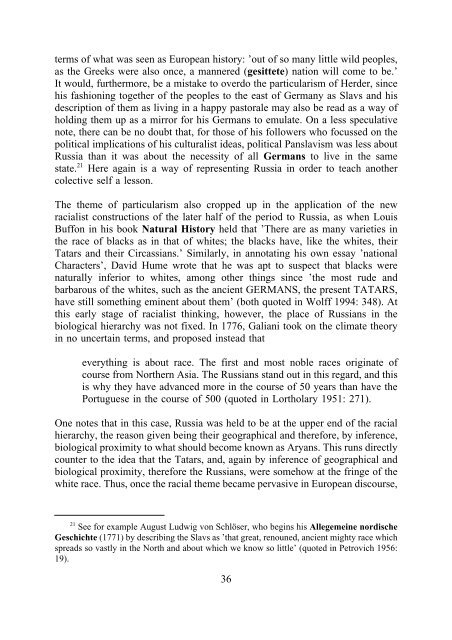RUSSIA AS EUROPE'S OTHER Iver B. Neumann European ...
RUSSIA AS EUROPE'S OTHER Iver B. Neumann European ...
RUSSIA AS EUROPE'S OTHER Iver B. Neumann European ...
Create successful ePaper yourself
Turn your PDF publications into a flip-book with our unique Google optimized e-Paper software.
terms of what was seen as <strong>European</strong> history: ’out of so many little wild peoples,<br />
as the Greeks were also once, a mannered (gesittete) nation will come to be.’<br />
It would, furthermore, be a mistake to overdo the particularism of Herder, since<br />
his fashioning together of the peoples to the east of Germany as Slavs and his<br />
description of them as living in a happy pastorale may also be read as a way of<br />
holding them up as a mirror for his Germans to emulate. On a less speculative<br />
note, there can be no doubt that, for those of his followers who focussed on the<br />
political implications of his culturalist ideas, political Panslavism was less about<br />
Russia than it was about the necessity of all Germans to live in the same<br />
state. 21 Here again is a way of representing Russia in order to teach another<br />
colective self a lesson.<br />
The theme of particularism also cropped up in the application of the new<br />
racialist constructions of the later half of the period to Russia, as when Louis<br />
Buffon in his book Natural History held that ’There are as many varieties in<br />
the race of blacks as in that of whites; the blacks have, like the whites, their<br />
Tatars and their Circassians.’ Similarly, in annotating his own essay ’national<br />
Characters’, David Hume wrote that he was apt to suspect that blacks were<br />
naturally inferior to whites, among other things since ’the most rude and<br />
barbarous of the whites, such as the ancient GERMANS, the present TATARS,<br />
have still something eminent about them’ (both quoted in Wolff 1994: 348). At<br />
this early stage of racialist thinking, however, the place of Russians in the<br />
biological hierarchy was not fixed. In 1776, Galiani took on the climate theory<br />
in no uncertain terms, and proposed instead that<br />
everything is about race. The first and most noble races originate of<br />
course from Northern Asia. The Russians stand out in this regard, and this<br />
is why they have advanced more in the course of 50 years than have the<br />
Portuguese in the course of 500 (quoted in Lortholary 1951: 271).<br />
One notes that in this case, Russia was held to be at the upper end of the racial<br />
hierarchy, the reason given being their geographical and therefore, by inference,<br />
biological proximity to what should become known as Aryans. This runs directly<br />
counter to the idea that the Tatars, and, again by inference of geographical and<br />
biological proximity, therefore the Russians, were somehow at the fringe of the<br />
white race. Thus, once the racial theme became pervasive in <strong>European</strong> discourse,<br />
21 See for example August Ludwig von Schlöser, who begins his Allegemeine nordische<br />
Geschichte (1771) by describing the Slavs as ’that great, renouned, ancient mighty race which<br />
spreads so vastly in the North and about which we know so little’ (quoted in Petrovich 1956:<br />
19).<br />
36

















